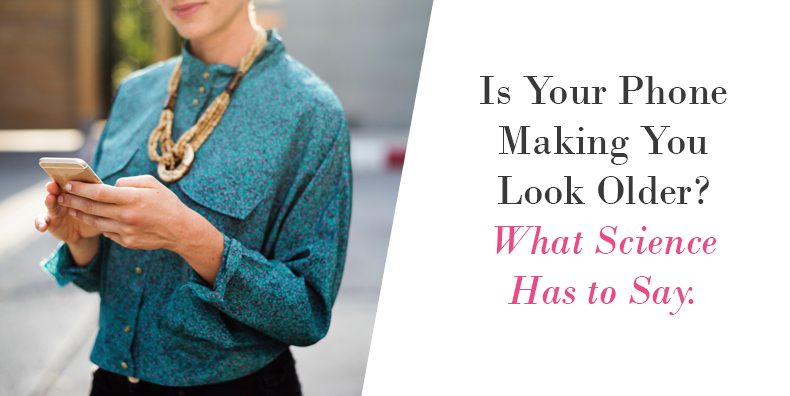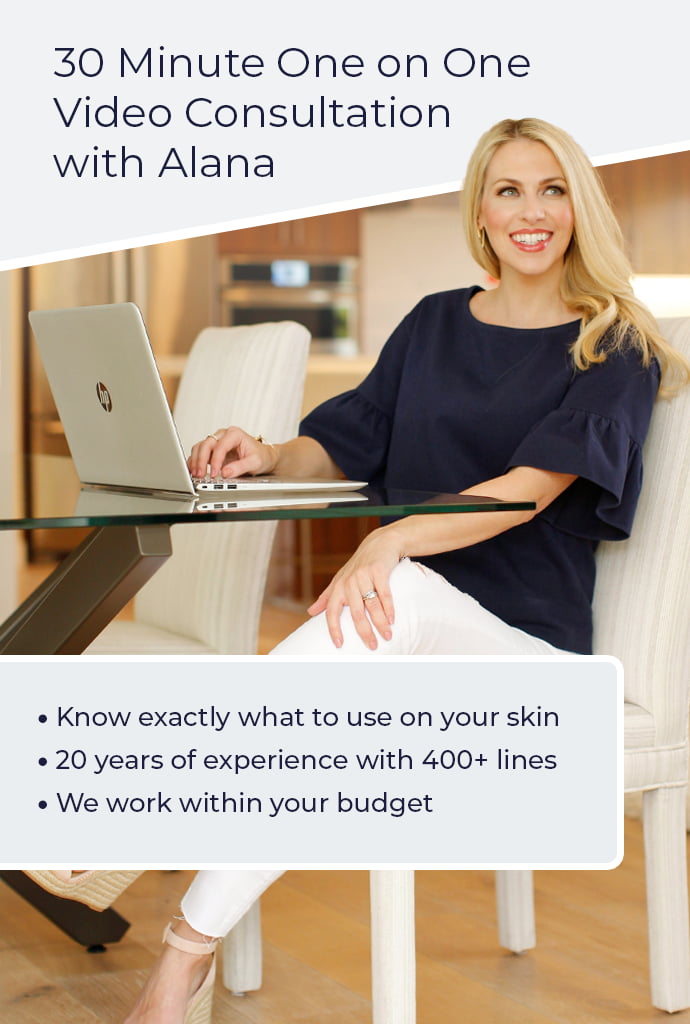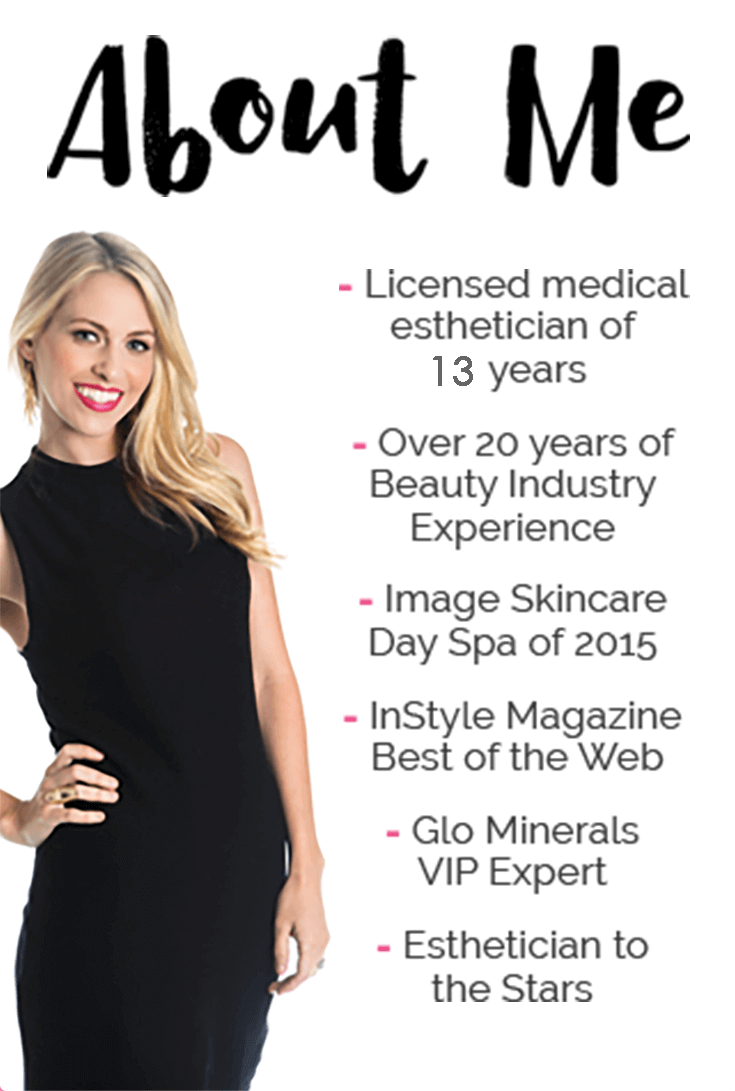What Should You Be Using In Your Skin Care Routine?
Take my quiz and get personalized recommendations from a
licensed esthetician!
Is Your Phone Making You Older? What Science Has to Say
Cell phones: love them, hate them, can’t live without them.
They’re now integrated into our way of life.

My kids won’t know what life was like before cell phones, which is crazy to me!
It seems like just yesterday when I thought my Nokia was cutting-edge technology...and I can’t believe the iPhone is already 10 years old.
We're definitely in the Digital Era as we spend most of our time in front of some sort of screen nowadays.
Now, we’ve all heard about the cancer risks (more on that later!), but can your phone affect your skin and make you age?
Keep on reading to find out!

What is Blue Light?
Unlike UVA and UVB rays, we can see blue light from the sun and our:
- Smartphones
- TVs
- Computers
- Tablets
- Fluorescent light bulbs
AKA high-energy visible light (HEV), blue light falls right in the middle of the light spectrum, between UV rays and infrared rays.
Its wavelength ranges from 380 nanometers (nm) to 500 nm (the entire light spectrum goes up to 700 nm).
Fun fact: HEV light rays make the sky look blue when they strike air and water molecules in the atmosphere.
Sunlight is the main source of blue light exposure; our devices only emit a small amount of radiation in comparison.
However, our phones are much closer to us than the sun.
A 2016 study found that Millennials check their phone 150 times per day compared to older adults, who check their phones only about 30 times per day.
This means Millennials get much more blue light exposure.

Blue Light and Your Skin
First, I want to make something clear: blue light does NOT cause skin cancer (phew!).
In an interview with Bustle, Dr. Patricia Ceballos, licensed dermatologist, said:
"Blue light itself, unlike solar UV radiation, does not contribute to skin cancer, because it doesn't induce DNA mutations the same way the sun does. But one study detected increased pigment production in skin exposed to blue light, which means that it's theoretically possible that chronic exposure to our smartphones and other electronic devices carries an increased risk of pigmentary disorders such as hyperpigmentation."
To summarize:
“The likelihood that blue light leads to premature aging of the skin is very remote. And its role in hyperpigmentation remains speculative."
There’s some speculation that our digital devices could be releasing free radicals that can cause premature aging.
A refresher: Free radicals strip the skin of barrier lipids, which help retain moisture and keep out impurities.
Losing this protection can result in skin damage, premature aging, increased sensitivity, and hyperpigmentation.
But this is a big MAYBE, and the science is still murky.
So, my approach is to protect your skin just in case.
Plus, just our environment alone can age us, too.
You’re probably doing this anyway with your skincare products and not even know it!
So, to sum up: While we don’t have to worry about blue light causing cancer, we should be aware of signs of aging (notice how I said "aware" instead of "afraid"!).
These can show up in the form of:
- Dark spots
- Hyperpigmentation
- Fine lines/wrinkles
- Inflammation
- Thinner/weaker skin
So, what can you do to protect your skin?
Use my Environmental Protection Nourishing Cream!
Whether you're on your smartphone or office computer, the Alana Mitchell Environmental Protection Nourishing Cream ups your skin's defenses against the HEV light effect on skin. Powerful ingredients, like microalgae, amino acids, vitamins, and minerals, help to prevent and diminish signs of aging while restoring your skin for a more radiant, youthful complexion.
Here are other ways you can shield your skin:
- Use sunscreen. This will provide a barrier between your skin and your digital devices (again, just to be safe). But you’re wearing it every day anyway, right?!
- Use a blue light filter and change the settings on your computer. Quick, easy, and inexpensive fixes that will save your eyes, too!
- Use products with antioxidants. I’ll go into further detail below!
Antioxidants Are Your Friend
If you’ve been reading my blog for a while, you know I’m a big fan of antioxidants.
If you’re concerned about your blue light exposure, use products with the following ingredients.
- Boosts collagen production
- Fights signs of aging
- Repairs skin by encouraging cell turnover and regeneration
- Brightens dark spots
- Reduces acne and treats rosacea
- Prevents premature aging due to polyphenols
- Combats excess oil production
- Fights undereye circles and swelling due to caffeine
Vitamin E
- Moisturizes
- Keeps skin healthy
- Brightens dark spots
- Fights signs of aging
- Smooths wrinkles
- Creates even skin tone
- Clears up acne
Coffee
- Reduces undereye puffiness
- Calms inflamed skin
- Brightens skin by stimulating blood flow
- Exfoliates without irritation

How Blue Light Affects Your Body
Blue light isn’t all bad!
During the day, it helps boost our attention, reaction times, and mood.
And, if you expose yourself to bright light during the day, you can actually sleep better at night.
However, you may have heard that it’s bad for sleep - which is also true.
Wait, what?!
Let me explain.
Many of us are using some sort of device in the evenings, which can throw off our circadian rhythm (our body's biological clock) and suppress melatonin secretion.
Some studies suggest a connection between nighttime light exposure to cancer, heart disease, diabetes, and obesity.
Don't worry, though!
We don't exactly know if nighttime light causes this or why it's bad for us.
The main thing is to stop looking at bright screens 2-3 hours before going to sleep.
And, if you're anything like me, you're probably too familiar with eye tiredness after staring at a computer screen for too long at work.
Research shows that too much exposure to lead to eyestrain, which causes sore or irritated eyes and difficulty focusing.
In the worst case scenario, studies suggest that continued exposure to blue light over time could lead to damaged retinal cells.
This can cause vision problems like age-related macular degeneration.
Again, the best thing to do here is to reduce your screen time (if you can), and maybe even take a 10-minute power nap in your car to rest your eyes!
You can also use anti-reflective coating for your eyeglasses if you wear them to reduce glare from screens.
There are even computer glasses your eye doctor can prescribe that block blue light and help ease eye strain.
We may also squint as we try to read the small print on our devices or when in a dark room.
This puts extra strain on the thin and sensitive skin around the eye, which can lead to puffiness, dark circles, and fine lines.
The solution?
Apply eye cream daily and go to your device's settings and make the text bigger.
"Tech neck" is another problem we experience when we're constantly looking down at our phone or tablet.
I'm sure you've seen others straining their neck and hunching their shoulders forward to see their screen.
This repetitive action can cause neck pain, posture changes, drooping jowls, and wrinkled, sagging skin.
Bring your device up to eye level and don't forget to include your neck and decollete as part of your skincare routine!

Other Tips to Keep Your Skin Healthy
First of all, I make sure to keep my phone clean, especially with the flu epidemic going around!
We put it on so many different surfaces without realizing it, and then that bacteria gets transferred to our face, hands, and even our bed (if you sleep with your phone).
Not only can this make us sick, but the buildup of oil, makeup, and environmental toxins on the screen can clog pores and cause breakouts when we repeatedly press our phone to our ear while talking.
Instead, use speakerphone, a headset, talk to text, or just text!
I’ve also been wiping my phone down with a Lysol wipe once a day.
By the way, we should not be sleeping with our phone in our bed (or near our head).
The California Department of Public Health (CDPH) just came out with some safety warnings and guidelines about cell phone use.
As I'm sure you've heard, there's a lot of speculation about radiation frequency (RF) that phones give off.
Some studies have suggested a possibility that "long-term, high use of cell phones may be linked to certain types of cancer and other health effects" such as:
- Brain, acoustic nerve, and salivary glands tumors
- Behavior, learning, or memory problems
- Sleep disturbances
- Headaches
Children may be more at risk because of their developing brains and bodies; the RF could affect the cells that are multiplying.
Additionally, the longer someone has been using a cell phone, the more RF they could have been exposed to.
Yikes!!
However, the guidelines said the cell phone and RF risk is "still evolving" because there isn't a definite cause and effect between RF and health problems.
Cell phone studies are difficult to do for two reasons.
First, they haven't been around long enough to fully measure long-term consequences.
Second, smartphone technology keeps evolving and more and more features are being unveiled.
It may take decades to fully understand how cell phones are affecting us.
While this sounds like scary stuff, we can take preventative steps.
According to the CDPH guidelines, we primarily need to be aware of instances when our phones definitely increase the amount of RF emitted.
These include a weak cell signal (only one or two bars show), riding in a fast-moving car, streaming video or audio, or downloading or sending large files using data.
If you want to minimize your chances of exposure, the CDPH recommends:
- Taking off a headset when you're not on a call (they can release small amounts of RF).
- Keeping your phone in your purse (not in your bra!).
- Putting your phone in airplane mode or use WiFi as much as possible.

We Know the Risks - Why Can’t We Stay Away?
Too much of a good thing can be a bad thing.
Technology addiction is becoming more commonly recognized and treated.
There are some pretty serious consequences: According to the CDC, cell phone use is somewhat to blame for the distracted driving that kills about nine people every day and injures more than 1,000.
A study by the Pew Research Center in 2010 revealed that nearly half of US adults admit reading or sending a text while driving.
So why can’t we stay away from our screens?
Texts and social media all contribute to the release of dopamine, which is the same neurotransmitter that rewards goal accomplishment.
Basically, phones make us feel good.
Certain personality types may be more susceptible, too, according to Dr. Nerina Ramlakhan.
"Are you a perfectionist? Are you a control freak? Do you grind your teeth at night? That's an A-type personality...they are likely to find themselves unable to switch off, they can't relax...Even if they are watching TV they have multi-screens."
Feeling like your phone controls you instead of you controlling your phone?
Here are some tips and tricks that can help:
- Don't use your phone as an alarm clock and don't check it as soon as you wake up; give yourself 30 minutes to read or make a cup of coffee.
- Try mindfulness and live in the moment! Turn off your phone when you're in a meeting, eating dinner, playing with your kids, and driving. Meditation is really helpful, too, and you only have to set aside a few minutes out of your day.
- Remove unnecessary apps from your phone (like Facebook and Twitter - you can check in on your computer).
- Check your emails in batches. I check my emails in chunks; once every hour or so. This saves a lot of time rather than continually checking throughout the day.
If you feel like your phone is really affecting your social life or your mental health, do a digital detox and take a break for 24 hours (hard, but not impossible!).
I’ve done this before and only answered really important calls, texts, and emails.
I avoided social media completely.
I felt like I had so much more time on my hands, and it helped me to re-balance my priorities!
I realized I didn't need my phone as much as I thought I did.
Some of My Favorite Antioxidant-Rich Products
Remember the ingredients I was talking about earlier?
They're found in the products below and will protect your skin from blue light.
Alana Mitchell Night R1 Facial Oil
Alana Mitchell Daily Vitamin C Moisturizer
Alana Mitchell Anti-Aging Peptide Eye Cream
Rhonda Allison Beta Green Tea Lotion
Epicuren Zinc Oxide Perfecting Sunscreen
Final Thoughts
Cell phones aren’t inherently bad or good, but they’ve definitely helped make everyday tasks easier.
My business wouldn't exist without the help of digital devices!
With our technology-centered lifestyle, it’s impossible to avoid the blue light completely.
My goal isn't to scare you; I just want you to be informed so you can make appropriate decisions about your skin and your health.
Healthy habits = a healthy life!
Beauties, after reading this article, are you going to change your phone habits? Why or why not? Let us know in the comments!
Top Brands
New Brands

Recent Posts

Are You Taking the Right Steps to Care for Your Skin?
Take the Quiz
Skincare Secrets!
10-step guide for healthy, beautiful skin after kids.
100% privacy. I will never spam you!



















